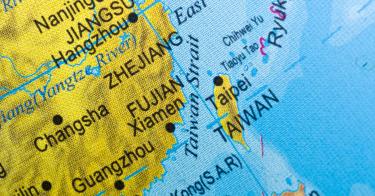Taiwan is in danger of being subsumed by China. But it’s not imminent, and it’s not because of what’s going on in Ukraine—at least not in the way you may think.
Bringing Taiwan under its control has been the driving objective of the People’s Republic of China’s (PRC) foreign policy since its founding. An invasion of Taiwan, or even seizing one of its outlying islands, however, is fraught with risk for China’s rulers.
First, there is the operational military risk. Unlike Russia’s invasion of Ukraine, a Chinese move on Taiwan involves it getting past hundreds of miles of water. This is one of the most difficult things for any military to do. And this is before it engages in any effort to take and hold ground. Failing in either phase would carry profound political consequences for the Chinese Communist Party’s (CCP) grip on power.
Then there is the risk of blowback from the international community, much as Russia is suffering right now. The eastern half of China is too rich and developed, too deeply integrated into global value chains, to absorb the sort of isolation that the world is now imposing on Russia.
Over the past 30 years, the Chinese people have forged a tacit bargain with the Communist Party: Keep the good times rolling, and we let you live. Frozen bank accounts and runs on banks would quickly upend this.
>>> Looking Ahead to China’s 20th Party Congress
Vladmir Putin’s whims do nothing to change these factors.
Besides, why would Beijing take any chances at all if it calculates that Taiwan’s security guarantor, the United States, is in terminal decline? Wait long enough and, devoid of meaningful outside support, Taiwan will fall into the CCP’s lap.
This isn’t just logical speculation. In 2021, General Secretary Xi Jinping said, “The world is undergoing great changes unforeseen in a century, but time and momentum are on our side. This is where our force and vigor reside, and it is also where our confidence and determination reside.” This line of reasoning is one with a long analytical tail. As Rush Doshi recounts in “The Long Game: China’s Grand Strategy to Displace American Order,” the concept first emerged in the wake of the 2008 financial crisis and what struck the CCP as the obvious long-term decline of the U.S.
Nothing has happened in the intervening years to change this analysis.
And now there is Ukraine. Vladimir Putin is leading a direct assault on the peace that the U.S. has kept in Europe for almost 80 years. A Putin win, or even a long stalemate, means a weaker U.S. If you’re in Beijing, you reckon that you just need to continue pressing your global advantages.
This historical trendline is Beijing’s greatest ally in taking Taiwan.
Sure, there is still work for Beijing to do. History must be enabled. This is what Beijing’s renewed and very successful campaign to poach Taiwan’s diplomatic allies is about. It’s behind its—again, successful—effort to prevent Taiwan’s fuller participation in international organizations. And it’s why Beijing’s talking points on Taiwan never change. Any capital that wishes to maintain diplomatic relations with China is obliged to recognize just “one China.” The nuances vary from country to country. Beijing interprets them all to mean “there is only one China, and Taiwan is a part of China.” And it reserves the prerogative punish any transgressions, actual, imagined or projected.
>>> Sleepwalking Into a China-Style Social Credit System
This explains Beijing’s frequent saber-rattling over Taiwan. Persistent and massive incursions into Taiwan’s Air Defense Identification Zone have operational benefits. They do not mean China is about to invade. They are warnings to Taiwan not to go too far in exercising its independence, let alone formally declaring it, and to the United States and others not to encourage Taiwan along these lines. It is essentially a threat to shoot the hostage. And it will shoot. Because allowing Taiwan to go independent uncontested also holds immense risk for the CCP.
The fact that the People’s Liberation Army (PLA) can now greatly complicate any American ride to Taiwan’s rescue in such a scenario has reinforced the predicted Chinese trend. And if this is not bad enough, there is now the prospect that in addition to U.S. failure in Afghanistan, they will be able to hold up Ukraine as a demoralizing example of American impotence.
The Chinese have us coming and going. Wait for history to unfold on the trajectory it’s on, and the Chinese win Taiwan without firing a shot. Force the issue on Taiwan, and go to war.
The only way to solve the puzzle is to change Chinese perceptions of the historical trend. Win in Ukraine, help Taiwan expand its international economic and political ties, and acquire the weapons it needs to defend itself. Most importantly, the U.S. must convince Beijing that it will have the material and resolve to win a war in the Taiwan Strait long into the future.
While what’s going on in Ukraine does not make war over Taiwan imminent, in the absence of such an effort, a Russian victory will help seal its fate.
This piece originally appeared in the Daily Caller



